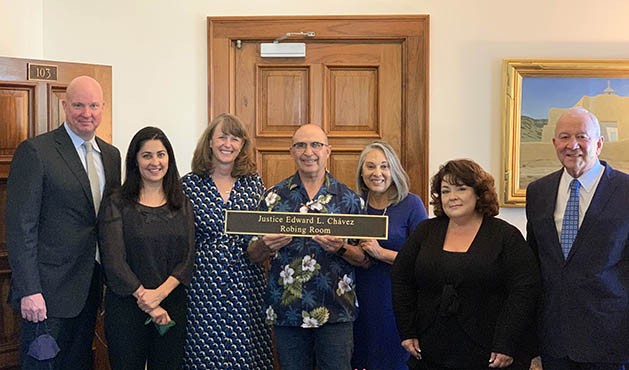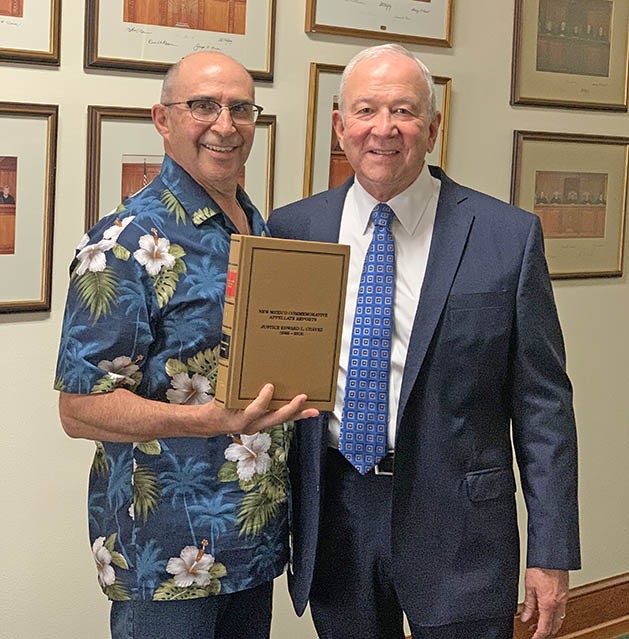 Members of the Supreme Court with retired Justice Edward Chávez and his wife in the robing room. From left: Justice David Thomson; Justice Briana Zamora; Chief Justice C. Shannon Bacon; retired Justice Chávez; his wife, Sandra; Justice Julie Vargas and Justice Michael Vigil. Courtesy/NMSC
Members of the Supreme Court with retired Justice Edward Chávez and his wife in the robing room. From left: Justice David Thomson; Justice Briana Zamora; Chief Justice C. Shannon Bacon; retired Justice Chávez; his wife, Sandra; Justice Julie Vargas and Justice Michael Vigil. Courtesy/NMSC
 Retired Justice Edward Chávez, left, and Justice Michael Vigil in the Supreme Court building with a newly published commemorative volume of opinions written by Justice Chávez. Courtesy/NMSC
Retired Justice Edward Chávez, left, and Justice Michael Vigil in the Supreme Court building with a newly published commemorative volume of opinions written by Justice Chávez. Courtesy/NMSC
NMSC News:
SANTA FE — The state Supreme Court (NMSC) has honored retired Justice Edward Chávez by dedicating its robing room to him and publishing a commemorative volume of opinions he wrote during his 15 years as a member of New Mexico’s highest court.
“Justice Chávez is the definition of professionalism, collegiality and diligence. Dedicating the robing room in his honor is a wonderful reminder to the Court of these qualities each time we hold oral argument,” Chief Justice C. Shannon Bacon said.
The Edward L. Chávez Robing Room is where the justices gather before entering the courtroom to hear oral arguments in cases and afterwards, they return to the room to deliberate in its conference area.
“I appreciate the kind and generous gesture by the justices and am honored to have the robing room bear my name,” Justice Chávez said, who joined the Court in 2003 and retired in 2018. He served as Chief Justice from 2007 through early 2010.
“The robing room is where we don our robes to symbolize the independence of the Judiciary and a judge’s fidelity to the rule of law and equal justice for all,” he said. “The robe is also a reminder of the importance of civility and collegiality as we work together to uphold the constitution and laws based on our own individual reading of the laws, unconstrained by political fear, fear for physical safety or other undue pressures, and uninfluenced by the status of the parties.”
The Court held a surprise informal dedication ceremony for the robing room last month. Justice Chávez and his wife, Sandra, attended. However, the justice was not aware in advance that he was to be honored. He also was presented with a bound volume of some of the major opinions he wrote. It represents the inaugural publication of opinions by retired justices. This volume and those in the future will be kept in the Supreme Court Law Library, the Supreme Court clerk’s office and at the law library of the University of New Mexico School of Law.
“In many respects, Justice Chávez not only contributed to the growth and maturity of the law in New Mexico, he wrote the foundation of that law,” Justice Michael Vigil wrote in the book’s foreword.
Among the seminal opinions in the commemorative volume are ones that recognized the right of same sex couples to marry and the right of non-English speaking citizens to serve on juries in New Mexico. Other opinions include those that declared unconstitutional an exclusion of farm and rancher laborers from workers compensation coverage and recognized the right of same sex partners to custody rights of adopted children. The volume includes about a fourth of the more than 200 opinions he wrote.
“In all his work, Justice Chávez demonstrates a profound commitment to equal justice under the law. Collegiality, modesty, and intelligence are his trademarks, punctuated by a genuine sense of humor. Justice Chávez is truly a ‘mensch’ – a person of integrity and honor,” Justice Vigil wrote in the foreword.
To prepare the book’s opening dedication, Justice Vigil spoke with friends and colleagues of Justice Chávez, including a judge who had to stealthily provide information about the retired justice while she and her husband were traveling with the Chávezes.
Justice Chávez was born in Santa Fe and graduated from Santa Fe High School in 1974 when he was 16 years old. He received an undergraduate degree in 1978 from Eastern New Mexico University and earned a Juris Doctor in 1981 from the UNM School of Law.
He said his favorite opinion in the volume was Moongate Water Co., Inc. v. City of Las Cruces, a 2013 decision that involved a utility and the issue of wrongful taking of property.
“I went to law school because a Vietnam veteran told me at ENMU about his dream to become a lawyer so that he could speak for those who could not speak for themselves,” the justice recalled. “I loved the idea and remembered that my grandparents were kicked off their property along I-40 near Clines Corners and I thought that would never have happened if grandpa and grandma had a lawyer. So, I committed to trying to become a lawyer. I have told that story since graduating from law school in 1981 all the way up to 2013. Turns out I was wrong.”
While researching to write the Moongate opinion, Justice Chávez found two legal cases involving his grandparents – Enrique and Isabel Chávez – and the state’s highway commission. The couple won their cases at the trial court level and on appeal.
“They did have lawyers and while the lawyers did not prevent them from being kicked off the land, they received compensation. I cited one of their cases in the Moongate opinion,” Justice Chávez said.

